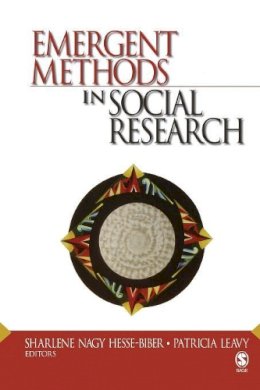
Stock image for illustration purposes only - book cover, edition or condition may vary.
Emergent Methods in Social Research
Sharlen Hesse-Biber
€ 106.17
FREE Delivery in Ireland
Description for Emergent Methods in Social Research
Paperback. Introduces social research methods that address the growing methods-theory gap within and across the disciplines. Editor(s): Hesse-Biber, Sharlene J. Nagy; Leavy, Patricia L. Num Pages: 448 pages. BIC Classification: GPS; JHBC. Category: (U) Tertiary Education (US: College). Dimension: 228 x 159 x 24. Weight in Grams: 598.
Emergent Methods in Social Research introduces state-of-the-art social research methods that address the growing methods-theory gap within and across the disciplines. In this text, editors Sharlene Nagy Hesse-Biber and Patricia Leavy combine original, in-depth introductions, previously published articles, and original works to provide readers with a comprehensive view of new and cutting-edge research methods and methodologies.
Key Features:
Intended Audience:
Perfect for graduate level Introductory and Intermediate Qualitative Research courses across the social sciences particularly Sociology, Political Science, Urban Studies, Anthropology, Communication, Social Work, and relevant Evaluation programs; as well as researchers and professionals interested in having a comprehensive view of new, cutting-edge, or alternative research methods.
Key Features:
- Combines theoretical and empirical pieces: Both theoretical and methodological issues at the cutting edge of research are explored. The linking of theoretical and empirical pieces, in addition to the focus on emergent methods, makes this book highly unique to the field.
- Focuses on two sub-topics: Emerging research techniques across disciplines and emerging methods within disciplines are examined. The scope of the work offers a very broad perspective of the possible uses and issues surrounding these techniques and methods. New methods include Listening, the Body, Auto-Ethnography, Biographical-Narrative Approach, Methodology of the Oppressed, Postcolonialism, Poststructuralism, Ethnodrama, and much more.
- Challenges traditional ethnography: Social researchers are encouraged to question traditional forms of knowledge construction within ethnography. Theoretical insights challenge ethnographic researchers to build bridges that link new research questions with innovative ethnographic methods that can address issues of power, authority, and representation in the research process.
Intended Audience:
Perfect for graduate level Introductory and Intermediate Qualitative Research courses across the social sciences particularly Sociology, Political Science, Urban Studies, Anthropology, Communication, Social Work, and relevant Evaluation programs; as well as researchers and professionals interested in having a comprehensive view of new, cutting-edge, or alternative research methods.
Product Details
Format
Paperback
Publication date
2006
Publisher
SAGE Publications Inc United States
Number of pages
448
Condition
New
Number of Pages
448
Place of Publication
Thousand Oaks, United States
ISBN
9781412909181
SKU
V9781412909181
Shipping Time
Usually ships in 4 to 8 working days
Ref
99-1
About Sharlen Hesse-Biber
Sharlene Nagy Hesse-Biber (PhD, University of Michigan) is Professor of Sociology and Director of the Women’s Studies & Gender Studies Program at Boston College in Massachusetts. She has published widely on the impact of sociocultural factors on women’s body image, including her book Am I Thin Enough Yet? The Cult of Thinness and the Commercialization of Identity, which was selected as one of Choice Magazine’s best academic books for 1996. She has also written widely on methodological and methods issues, including the role of technology and emergent methods in social research. Dr. Hesse-Biber is co-editor of Emergent Methods in Social Research and the Handbook of Emergent Methods, as well as co-author of The Practice of Qualitative Research. She is also editor of the Handbook of Feminist Research: Theory and Praxis, which was selected as one of the Critics’ Choice Award winners by the American Education Studies Association and was also chosen as one of Choice Magazine’s Outstanding Academic titles for 2007. Dr. Hesse-Biber is co-developer of the software program HyperRESEARCH, a computer-assisted program for analyzing qualitative data, and the new transcription tool HyperTRANSCRIBE. For more information, see www.researchware.com. Patricia Leavy specializes in qualitative methodology, collective memory, popular culture and gender. Leavy previously taught at Boston College, Northeastern University and Curry College. She is the author of Iconic Events: Media, Politics and Power in Retelling History (Lexington Books, 2007), Method Meets Art: Arts-Based Research (Guilford Press, 2009) and Oral History: Understanding Qualitative Research (Oxford University Press, 2011). She is coauthor of Feminist Research Practice (Sage, 2007) and The Practice of Qualitative Research (Sage, 2005; 2011). She is the co-editor of Hybrid Identities: Theoretical and Empirical Examinations (Brill, 2009); Handbook of Emergent Methods (Guilford Press, 2008); Emergent Methods in Social Research (Sage, 2006) and Approaches to Qualitative Research: A Reader on Theory and Practice (Oxford University Press, 2004). She is currently the editor for a large book series with Oxford University Press titled Understanding Qualitative Research. Leavy has also authored articles on methodology, body image, collective memory, and media. She is regularly quoted in newspapers for her expertise on popular culture and gender and has appeared on CNN’s Glenn Beck Show and Lou Dobbs. Leavy is the founding Director of the Gender Studies Program at Stonehill. Patricia Leavy was named the New England Sociologist of the Year 2010 by the New England Sociological Association.
Reviews for Emergent Methods in Social Research
"All of the book′s chapters are written with enthusiasm and an interest to stimulate researchers to make new uses of traditional data gathering methods and/or develop new ideas."
Daunta A. Nitecki
Daunta A. Nitecki
